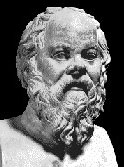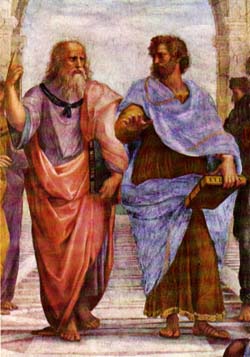| Th 1/20 |
Course Introduction:
What is Philosophy of Education? |
|
|
|
I. Raising
Questions about Education: Plato's Republic and Socratic Method |
| T 1/25 |
Republic II (all, but see especially 358e-360d, 369a-370c, 373d-383c) |

Plato
|
What problem is Socrates attempting to address
with the educational system he devises? What is the importance of
the soldier or guardian class in the state Socrates describes? What
characteristics should they have? What form will their education
take? Why? |
| Th 1/27 |
Republic III |
|
What kinds of persons must the guardians be? How will Socrates'
proposed education promote the desired qualities? What sorts of stories
will the rulers tell to the citizens of the state? What relationship
does Socrates seem to think holds between art and character? |
|
|
| T 2/1 |
Workshop 1: Censorship |
|
Does sound educational policy require that students be screened from
certain types of information? If so, on what grounds, and according
to what standards? If not, what is the value of unimpeded informational
access? In considering this controversy, think about specific applications
to contemporary school issues (school and classroom libraries, internet
access, etc.). |
|
|
| Th 2/3 |
Workshop 2:
Tracking/Ability Grouping |
|
Should students be separated into distinct ability groups for educational
purposes? What different forms do ability grouping or tracking plans take
(e.g., gifted, special, vocational vs. academic)? What are the benefits
and drawbacks of ability grouping or tracking policies? On balance,
is ability grouping helpful or harmful to students? |
|
|
| T 2/8 |
Republic IV, 424a-427a; 434d-445e; V, 451d-457c |
|
On what theory of human nature is Plato's educational theory grounded?
How does this theory of human nature provide the basis for a theory of
the four cardinal virtues (bravery, wisdom, temperance, and justice)?
What natural differences exist between men and women? Should those
differences result in different educational programs? Why or why
not? |
|
|
| Th 2/10 |
Workshop 3: Moral Education |
|
Should students be taught right and wrong? Or "values"?
Why or why not? If they are to be taught values, whose values will
they be taught? How does a teacher go about teaching values?
Should they be inculcated in the students, or drawn out of the students?
Why? |
|
|
| T 2/15 |
Republic V, 473aóVI, 489d; VI, 502c-511c |
|
What does Socrates mean by saying that philosophers must be rulers,
and why does he think that it is a true statement? What are philosophers,
and what do they know? What is the Good, and how is knowledge of
it related to all other types of knowledge? How do Socratesí analogies
of the Sun and the Line illustrate his point? |
| Th 2/17 |
Republic VII (all, but see especially 514a-521d, 531d-541b) |
|
In what ways is the Cave an image of education? What does Socrates
think true education is? What curriculum must be used for the philosopher-rulers
to accomplish the aim of knowing the Good? What is the rationale
for each of the subjects to be studied? What is dialectic, and why
is it appropriate as the last step? |
|
|
| F 2/18 |
Plato paper draft due 12 noon
(required) |
|
|
| T 2/22 |
Socratic Method--Plato, Meno (online excerpts); David H. Calhoun,
"Which Socratic Method?" (online reserve) |

Socrates
|
Is Socrates a teacher? What sorts of things does he do in the
dialogue? What is the exchange with the slave boy supposed to illustrate?
Is Socrates teaching the boy? What answer do Socrates and Meno reach
on the question of whether virtue can be taught or not?
Reflection: What does the "Socratic Method" have to do with the apparent
practices of Socrates himself? |
|
|
| Th 2/24 |
Workshop
4: Person and Task of the Teacher |
|
What kind of person must a teacher be? What is good teaching?
What characteristics and activities mark the good teacher? Is a teacher
a professional? If so, in what sense? What roles must the teacher
play? Can or should the teacher be a counselor for students?
(Thought experiment: how are teachers portrayed in TV, movies, and other
popular media? Does this indicate what we expect teachers to be like?
How realistic are these portrayals?) |
|
|
| F 2/25 |
Plato paper due 12 noon |
|
|
|
II. Educational Theories:
Rousseau and Dewey |
| T 2/29 |
Rousseau, Emile, I (read pp. 37-42, 47-54, 61-68 in Bloom edition) |

Jean-Jacques Rousseau
|
What are Rousseauís basic educational principles? How does he
apply them to infancy and early childhood? In what sense is his approach
"natural"? Who is the best teacher, and why? |
| Th 3/2 |
Rousseau, Emile, II (read pp. 77-93, 112-16) |
|
What subjects does Rousseau include in the early curriculum, and why?
What things does he eliminate, and why? What is the teacherís primary
objective in his intereractions with the student in early childhood? |
|
|
| 3/4-3/12 |
Spring Vacation |
|
|
| T 3/14 |
Rousseau, Emile, III (read pp. 165-72, 178-82, 184-88, 195-98) |
|
What is the key physical attribute of the adolescent child? How
does it affect educational plans and curricular emphases? How can
life experiences be used to stimulate education? What book does Rousseau
wish Emile to study, and why? |
| Th 3/16 |
Rousseau, Emile, IV (read pp. 211-15, 219-23, 235-37, 255-59,
266-77) |
|
What change in the child is most important for education in adolescence?
Should males and females be treated differently? Why or why not?
What objective does the teacher have with respect to the passions of the
child? At what time and in what way should the child be introduced
to religion? |
|
|
| T 3/21 |
Workshop
5: Open vs. Structured Education |
|
Ever since Rousseau, a number of educational theorists have stressed
the benefits of an unstructured or "open" educational environment.
Recent versions of this approach have included Montessori education and
the "open schooling" model put in to practice at A. S. Neillís experimental
school Summerhill. Of course, some of these theorists would admit
that apparent chaos in the classroom is an illusion created by the careful
teacher. On the other hand, some theorists such as the behaviorists
assert that a highly structured learning environment is most likely to
produce educational success. Can student interest supply the structure
for formal education, or must structure be imposed from without by the
educator? |
|
|
| Th 3/23 |
Workshop 6: Religion
and Education |
|
To what extent (if any) should religious questions and topics be incorporated
in the school curriculum? Should religion be treated at all in public
school curricula? Why or why not? What is the current state
of the law regarding religion and public education? What are the
problems and possibilities of integrating religion into education? |
|
|
| T 3/28 |
Rousseau, Emile, V (read pp. 357-68, 377-85, 471-80) |
|
Do men and women have the same natural abilities and ends? If
not, how do they differ? What does this imply for the principles
and objectives of educating females? What about education concerning
religion and social relationships? |
|
|
| Th 3/30 |
Workshop 7: Male/Female
Education |
|
Should males and females be educated equally? Should males and
females be educated identically? (Note that equal education does
not necessarily require identical education.) Are male and female
roles based on differences of nature between men and women, or are such
roles culturally constructed? What perspective do contemporary feminists
offer on these questions? |
|
|
| T 4/4 |
Dewey, Democracy and Education, Chap. 1-2 |

John Dewey
|
What does Dewey think the objective of education is?
How does education promote the healthy functioning of society? What
role does environment play in education? What psychological model
grounds Deweyís account? How does Dewey's general account apply to
formal schooling? |
| Th 4/6 |
Dewey, Democracy and Education, Chap. 6, 7 |
|
What distinguishes "formation," "recapitulation," and "reconstruction"
as general approaches to education? Which does Dewey prefer, and
why? What "technical definition" of education flows from Dewey's
analysis? Why, on Dewey's view, is a democratic state the ideal context
for education? How does Dewey contrast his position to Plato's and
Rousseau's? |
|
|
| T 4/11 |
Workshop
8: Education, Culture, and Multiculturalism |
|
Should education emphasize our shared cultural heritage, or our diversity,
or both? How? What is the aim of a liberal education?
Does liberal education exclude the contributions of non-Western cultures?
If not, how can it include them? What is multiculturalism?
What issues are at stake in trying to implement a multicultural education? |
|
|
| Th 4/13 |
Workshop
9: Political Implications of Educational Policy |
|
How are educational aims of a system of schooling related to the political
context in which education takes place? Is it the task of an educational
system to support the political regime, or to call it into question?
Put another way, is education primarily conservative or revolutionary? |
|
|
| T 4/18 |
Dewey, Democracy and Education, Chap. 12, 15 |
|
What does Dewey mean by "thinking," and why does he identify it as
the most important task for schooling? How is his emphasis on thinking
related to his general objective of preparing students for citizenship
in a democracy? How does Dewey think that immaturity leads to growth?
What are the respective roles of play and work in this process? How
is Dewey's ultimate criterion for the success of any educational program
related to his theory of growth? |
| Th 4/20 |
Dewey, Democracy and Education, Chap. 24-25 |
|
What is Dewey's conception of philosophy? What is the relationship
between philosophy and education? What is dualism and why does Dewey
find it troublesome for education? What theory of knowledge, in Deweyís
view, offers the most promise for a democratic system of education, and
why? |
|
|
| T 4/25 |
Workshop
10: Education, Truth, and Relativism |
|
The differences between the theories of education offered by Plato
and Dewey demonstrate the epistemology--the theory of knowledge--has important
implications for educational policy. Are there ultimate truths?
If so, what implications will that have for educational policy? By
contrast, what sort of education results from a non-essentialist theory
of knowledge? What is relativism, and how should education address
it? |
|
|
| W 4/26 |
Education theory
paper draft due 12 noon (required) |
|
|
| Th 4/27 |
Inquiry Teaching; Teaching and Community |
|
Postman and Weingartner, Teaching as a Subversive Activity (reserve)
What is the inquiry method? What sorts of classroom activities,
both for students and teachers, does it emphasize? What sort of educational
content is most appropriate for it? What do Postman and Weingartner
mean by "relevance," and how does one determine what is "relevant" for
a class?
Parker Palmer, "Community, Conflict, and Ways of Knowing" (reserve)
How does education raise problems of community? What does Palmer
mean by "epistemology," and why is it important to the educational project?
What epistemology does Palmer advocate, and why? What are the consequences
of Palmerís account for the structure of education? |
|
|
|
III. Contemporary
Education Reform |
| T 5/2 |
Current Projects in Educational Reform |
|
|
| Th 5/4 |
Course conclusion: What are the proper objectives of an educational
system? |
|
|
| M 5/8 |
Education theory paper
due 12:30 p.m. |
